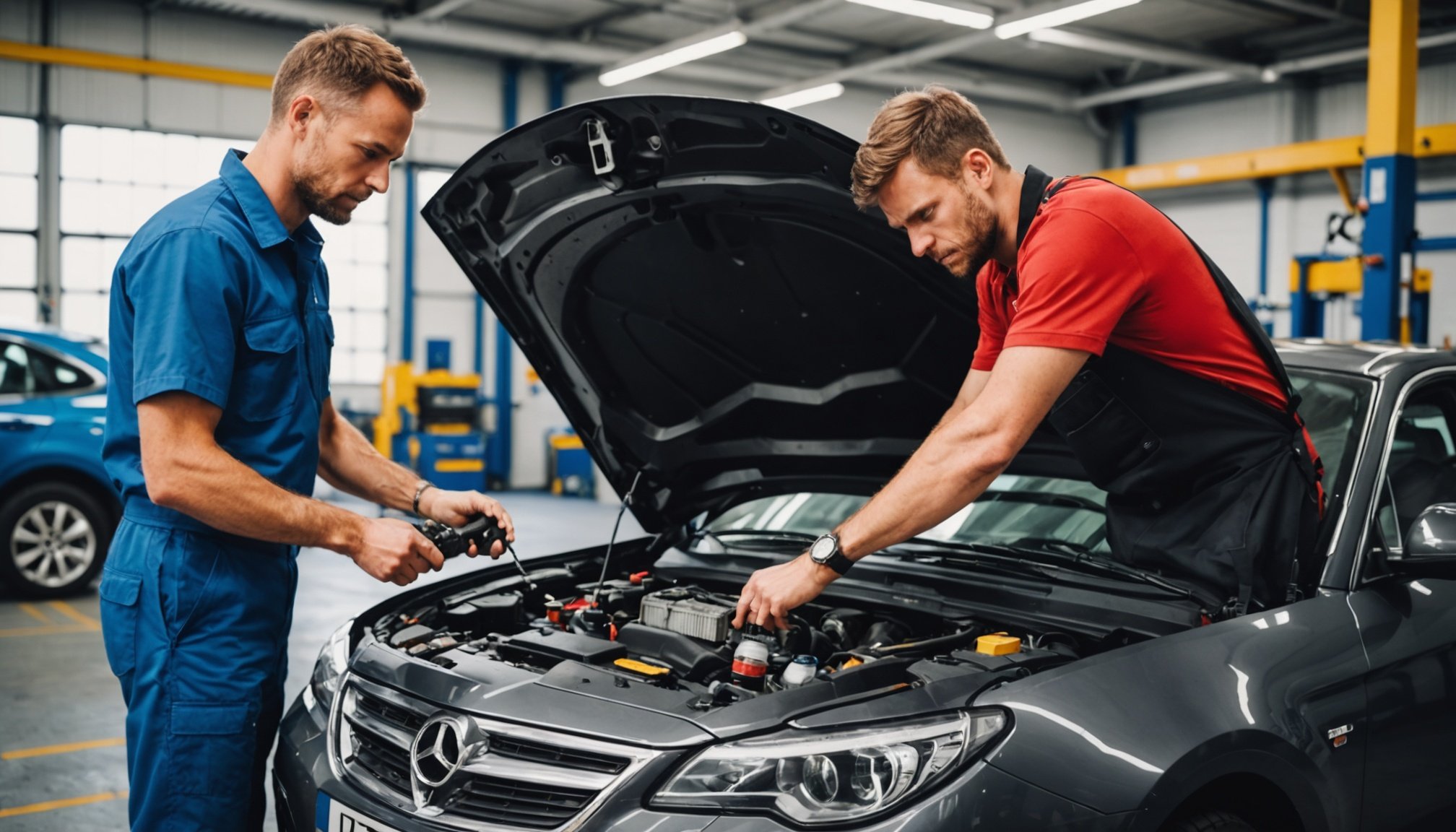Introduction to Vehicle Maintenance in 2024
Understanding the nuances of vehicle maintenance in the UK is crucial for ensuring optimal performance and safety. Regular maintenance not only prevents costly repairs but also enhances the life of the vehicle, providing peace of mind for drivers.
In 2024, changing regulations will play a significant role in how vehicle maintenance is approached. Environmental considerations and technological advancements are prompting updates in regulation, impacting how vehicles are maintained and inspected. For instance, emissions standards are evolving, and vehicle owners must comply with new rules to avoid penalties.
Topic to read : Unlocking Track Potential: The Ultimate Guide to Installing and Optimizing a Performance Data Logger for the McLaren 720S
Moreover, seasonal factors are poised to impact vehicle care more than ever. Fluctuations in temperature and weather conditions demand specific maintenance routines. For example, in winter, checking antifreeze levels becomes essential, while summer might necessitate a focus on cooling systems.
This backdrop sets the stage for practical tips and insights into vehicle maintenance, ensuring drivers are well-prepared for challenges in 2024. As you delve deeper, you’ll find actionable advice on keeping your vehicle in top shape, meeting regulations, and adapting to seasonal changes—all while maintaining safety and performance.
Also to see : How Green Policies are Revolutionizing the Car Industry for a Superior Driving Experience
Seasonal Maintenance Checks
Regular seasonal vehicle checks are key to ensuring your vehicle performs optimally across the varied UK weather landscape. Seasonal changes demand specific maintenance routines that, when performed timely and correctly, can significantly enhance your vehicle’s longevity and safety.
Spring Maintenance Checklist
With spring’s arrival, focus on checking crucial elements like tyre pressure and fluid levels. Spring is the perfect time to inspect and replace wiper blades and check the battery for winter-related stress. Cleaning and lubricating hinges or seals, which might have taken a beating during the colder months, is also advisable. Regular checks ensure smooth transitions between weather extremes.
Summer Care Tips
Summer demands attention to the cooling system. Excessive heat can impact engine performance, so ensure coolant levels are adequate. Examining air conditioning systems ensures comfort and reduces strain on engine performance. Also, ultraviolet exposure can degrade paintwork, so wash and wax regularly.
Autumn Preparations
Autumn brings unpredictability, making the examination of brakes crucial—damp roads mean less traction. Also, checking defrosters and heater functionality can mitigate fog-related distractions or discomfort. Revisit fluid levels and address early signs of wear to avoid complications during the harsher winter months. Essential maintenance now prevents costly repairs later, ensuring readiness for any seasonal transition.
Essential Safety Inspections
Vehicle safety inspections play a critical role in maintaining both regulatory compliance and driver safety across the UK. These inspections are mandatory and ensure that all vehicle components are operating effectively. Typically, these checks include examination of brakes, lights, tyres, and steering, as well as emissions testing to meet UK standards.
Safety inspections are recommended annually, aligning with the MOT (Ministry of Transport) test, which assesses vehicle safety, exhaust emissions, and roadworthiness. However, regular safety checks between MOT tests can preemptively address any emerging issues, providing an extra layer of safety and vehicle preservation.
Common issues often identified during these inspections include worn brake pads, tyre tread depth below the legal limit, and faulty indicator lights. Addressing these promptly can prevent accidents and reduce potential repair costs.
Ensuring your vehicle passes inspections efficiently requires consistent maintenance and awareness of any changes in UK safety standards. Staying proactive not only guarantees compliance but also enhances overall vehicle safety and performance. Adherence to regular vehicle safety inspections reduces risks and ensures readiness for the road, safeguarding not just the driver, but all road users.
Cost-effective Maintenance Practices
Engaging in DIY vehicle maintenance can drastically reduce costs while ensuring your vehicle remains in optimal condition. For those savvy enough to handle routine checks and minor repairs, significant savings can be unlocked. Begin by acquainting yourself with low-cost tools essential for basic maintenance tasks. These include an oil filter wrench, tyre pressure gauge, and a set of basic wrenches and screwdrivers, all readily available at affordable prices.
Undertaking maintenance at home brings the advantage of flexibility, allowing tasks to be completed at leisure. However, the importance of understanding the limitations of DIY efforts cannot be overstressed. Remember, while minor checks and repairs can be economically advantageous, more complex issues might require professional attention. Incorrectly performed tasks can lead to greater expenses down the line.
Utilising resources such as online tutorials and vehicle-specific guides can aid in mastering basic procedures like oil changes, brake pad replacements, or checking fluid levels. Doing so enhances your confidence and skills over time. In summary, cost-effective vehicle care requires knowing when to tackle maintenance yourself and recognizing when to call in the experts. This balance ensures you maintain both your budget and your vehicle’s health effectively.
Choosing the Right Service Providers
Selecting the right vehicle service providers in the UK can ensure high-quality maintenance and repair work for your vehicle. There are several factors to weigh when evaluating local garages to guarantee your vehicle receives the best care possible.
Evaluating Local Garages
Local garages vary in expertise and services offered. To make informed decisions, consider factors such as proximity, available services, and qualifications of the mechanics. Visiting the garage for a preliminary inspection can provide insights into their operation standards and customer service quality. Compare price quotes for similar services from different garages to ensure value.
Understanding Warranty Services
Understanding warranty services can help protect your vehicle against unforeseen issues. Manufacturers often require scheduled services with approved providers to maintain warranty validity. Ensure the chosen service providers understand and adhere to these specifications, safeguarding your vehicle’s protection and value.
Reviews and Recommendations
Reviews and recommendations play a crucial role in choosing a provider. Reliable feedback from other vehicle owners, available online or through word-of-mouth, can highlight strengths and potential pitfalls of specific garages. Look for positive reviews relating to punctuality, customer service, and expertise – key indicators of dependable service. Consistent praise suggests a trustworthy choice for maintaining optimal vehicle performance.
Compliance with UK Regulations
Navigating UK vehicle regulations is crucial for drivers to avoid legal pitfalls and maintain vehicle safety. Key areas include ensuring compliance with regular MOTs (Ministry of Transport tests) and emissions checks, which are mandatory for determining a vehicle’s roadworthiness and environmental impact. Failure to comply can lead to fines and restrictions, making timely inspections essential.
To meet legal requirements, vehicle owners should stay informed about regulation updates, such as adjustments in emissions standards. This requires periodic checks and potential updates to vehicle systems to align with new standards. Staying proactive not only ensures compliance but also reduces the likelihood of penalties or unexpected issues.
Vehicle legislation in the UK can evolve, and a proactive approach helps in planning maintenance schedules and budgeting for necessary modifications. It’s advisable to consult updated government resources or vehicle specialists for guidance on compliance. In the face of changing regulations, remaining informed allows vehicle owners to take timely actions, ensuring that their vehicles remain both legal and safe for UK roads. Maintaining an understanding of these requirements builds confidence and peace of mind, knowing your vehicle meets all necessary standards.
Tools and Equipment for Vehicle Maintenance
Equipping yourself with the right vehicle maintenance tools is paramount for efficient and cost-effective care. Every vehicle owner should possess a few essential tools that facilitate basic maintenance tasks and ensure smooth operation.
Key items include a tyre pressure gauge and an oil filter wrench, which are indispensable for routine checks. A set of basic wrenches and screwdrivers further supports miscellaneous repairs, making them crucial components of any toolkit.
Efficiently organizing your home maintenance toolkit is just as important as having the right tools. Utilize a sturdy toolbox to keep items neat and readily accessible. Separating tools by category—such as metric and imperial wrenches—simplifies the task, allowing for quicker access.
For those keen on tackling more complex tasks, investing in specialised equipment is advisable. Tools like a battery charger or a jack stand can transform daunting procedures into manageable chores. Moreover, equipment compatible with digital diagnostic tools can aid in identifying issues early, preventing costly repairs.
Owning and organizing the proper tools not only streamlines the maintenance process but also builds confidence, ensuring your vehicle remains in peak condition.
Conclusion and Future Considerations
As we navigate vehicle maintenance in 2024 and beyond, emerging technologies and changing regulations demand attention. Notably, the rise of digital diagnostic tools is transforming how we approach routine checks, offering precise insights into vehicle health. These tools not only foresee potential problems but also guide owners towards preventive measures, effectively reducing unforeseen expenses and ensuring optimal performance.
Additionally, evolving best practices encourage owners to stay informed about industry advancements. The integration of AI and machine learning in vehicle systems enhances efficiency and reliability, making it imperative for drivers to adapt to these innovations. For instance, adaptive maintenance schedules, automatically adjusted based on real-time data, could soon become a norm.
Staying abreast of trends also involves understanding future regulatory changes. Anticipating shifts in UK vehicle regulations, such as stricter emissions standards, equips vehicle owners to proactively adjust to these demands, avoiding legal pitfalls and ensuring compliance.
In conclusion, embracing a forward-thinking mindset regarding vehicle maintenance leads to a smarter approach, ultimately enhancing the safety and longevity of your vehicle. Equip yourself with knowledge and tools, ensuring readiness for the future of vehicle care.





